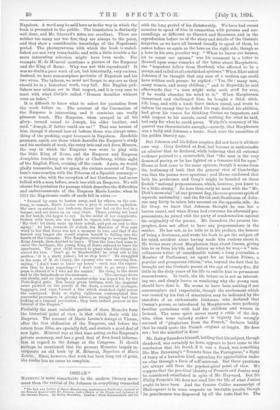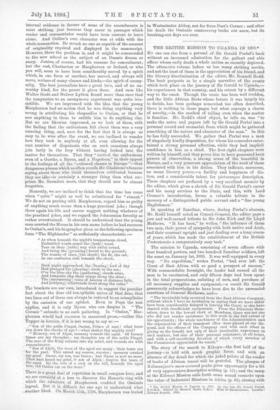OSSIAN.* NOTHING is more remarkable in the modern literary move-
ment than the revival of Dr. Johnson in everything connected * The Life cud Letters of james Macpherson, containing a Particular Aecount of hie Famous Quarrel with Dr.. Johnson, and a Sketch of the Origin and Influence of She Ossianic Poems. By Badoy Saunders. London Swan Sonnencoheln and Co. With the long period of his dictatorship. We have had recent occasion to speak of him in connection with persons and sur- roundings so different as Garrick and Rousseau, and in the reproduction before us of the story and details of the Ossianic forgeries, as we have all learned broadly to speak of them, he comes before us again as the hero on the right aide, though as a hero in his own peculiar way. "When he leaves our houses, let us count our spoons," was his comment in a letter to Boswell upon some remarks of the latter about Macpherson, the "impudent fellow from Scotland, who affected to be a savage, and railed at all established systems." When Blair asked Johnson if he thought that any man of a modern age could have written such poems, he replied : "Yes, Sir ; many men, many women, and many children ; " and to Reynolds he said afterwards that "a man might write such stuff for ever, if he would abandon his mind to it." When Macpherson threatened and challenged him, he bought a thick stick, 6 ft. long, and with a knob three inches round, and wrote to inform his enemy that he defied his rage, denied his abilities, had given his reason for thinking Ossian an imposture, and with respect to his morals, cared nothing for what he said, but only for what he could prove. Walpole's summary of the quarrel was characteristic enough,—namely, that Macphersou was a bully and Johnson a brute. Such were the amenities of the golden literary age.
But Johnson and his fellow sceptics did not have it all their own way. Gray doubted at first, but became so enthusiastic an admirer that he declared, while believing that all external evidence pointed to a counterfeit, that "the man is the very demon of poetry, or he has lighted on a treasure hid for ages." Hume at first came to the same opinion, though it seems from the testimony of both that the general view of Cambridge was that the poems were spurious ; and Hume confessed that both his preference an.d Gray's might be founded on those Scotch "national prepossessions, which, however, you know to be a little strong." So here thus early we meet with the "Mr. Dick's memorial" of our present day, the ever-present spirit of separate nationality; and the fervid anti-Scotticism of John- son may fairly he taken into account on the opposite side. As for Gray, we know that Johnson thought he was but a barren rascal, and when Hume had overcome his aforesaid pre- possessions, he joined with the party of condemnation against the originality of the poems. Mr. Saunders, the present bio- grapher, does not affect to have any prepossessions in the matter. He has not, as he tells us in his preface, the honour of being a Scotsman, and wrote his book to get the subject off his naind, accident alone having made him curious about it. He writes more about Macphereon than about Ossian, giving him to us from his life and letters as what he " mis- cellaneous writer of considerable talent, a busy journalist, a Member of Parliament, an agent for an Indian Prince, a popular and prosperous citizen," who, beyond the fact that he brought out the Oesianic poems at the age of twenty-five, did little in the sixty years of his life to entitle him to permanent remembrance. In truth, the life before us is not an interest- ing one, and simply leaves us wondering why the young man should have done it. He seems to have been nothing if not commonplace and respectable, though the excitement which was caused by his feat of simulation may be indicated by the anecdote of an enthusiastic Irishman, who declared that Ossian's poems, as introduced by Macpherson, were perfectly familiar quotations with half the children and women in Ireland.. The same spirit moves many a critic of the day, -who, when some unlucky author is vaguely but wrongly accused of "plagiarism from the French," declares boldly that he could quote the French original at length. He does not ; but the mischief is done.
Mr. Bailey Saunders himself, holding that his subject, though slandered, was certainly no hero, appears to have come to the conclusion that his fraud, if it was a fraud, was something like Mrs. Browning's "Sonnets from the Portuguese," a flight of fancy of a harmless kind, appealing for appreciation wader an alias through a form of self-mistrust. But these questions are always odd from the psychological point of view. We suppose that the practical identity of Francis and Junius may be considered established in spite of Mr. Hayward. But Sir Philip Francis's life does not read like the life of what Junius ought to have been. And the famous Collier manuscript of Shakespeare is in some respects an insoluble puzzle, though its genuineness was disproved by all the tests that be. The internal evidence in favour of some of the amendments is most striking, just because they occur in passages which reader and commentator would have been content to leave alone. And Collier's own character was at odds with the whole transaction. He struck no one as capable of the amount of originality required and displayed in the manuscript. However, there the problem is, and it might be commended to the new eehool as the subject of an Ibsenic drama or story. Junius, of course, had his reasons for concealment; but the rest, Chatterton or Macpherson or Ireland, or who you will, seem to have been considerably moved by a spirit which, in one form or another, has moved, and always will move, writers of many classes and kinds,—the spirit of anony- mity. The best journalists have a great love, and of no un- worthy kind, for the power it gives them. And men like Walter Scott and Bulwer Lytton found more than once that the temptation to an anonymous experiment was quite irre- sistible. We are impressed with the idea that the young Maephereon had no notion that he was doing anything very wrong in attributing his rhapsodies to Ossian, or that he saw anything in them to entitle him to do anything else. But we are likewise impressed, as we look at them, with the feeling that the enthusiasm felt about them was a very amazing thing, and, save for the fact that it is always so easy to be wise after the event, we are inclined to wonder how they took in anybody at all, even allowing for the vast number of disputants who on such occasions always join hotly in the fray Without having looked into the matter for themselves. That they "excited the enthusiasm even of a Goethe, a Byron, and a Napoleon," in their appeal to the feelings of all the "cultured classes in Europe "—that dangerous phrase which so often recalls Mr. Gladstone's famous saying about those who think themselves cultivated because they are idle—is certainly a stranger thing than what sur- prises Mr. Saunders more, that they should now be almost forgotten.
Honestly, we are inclined to think that the time has come when " quite " might as well be substituted for "almost." We do not on parting with Macpherson, regard him as guilty of anything much worse than a huge practical joke ; though there again his life and career suggest nothing whatever of the practical joker, and we regard the Johnsonian ferocity as rather overstrained. It should be understood that the young man courted the Muses in his own name before he had recourse to Ossian's, and his biographer gives us the following specimen from "The Highlander" as sufficiently characteristic :— " As when beneath the night's tempestuous cloud, Embattled winds assail the [leafy] wood, Tear on their [sable] way with awful sound, And bring the [groaning] forest to the ground; The trunks of elms, [the shrubl, the fir, the oak,
• In one confusion sink beneath the shock.
Dark night approached, the [flaming] lord of day Had plunged his [glowing] circle in the sea; O'er the blue sky the [gathering] clouds arise, And tempests clap their wings along the skies ; The [murmuring] voice of heaven at distance fails, And [eddying] -whirlwinds howl along the vales."
The brackets are our own, introduced to suggest the peculiar fact about the dear old ten-syllable metre of that date, that two lines out of three can always be reduced to an octosyllabic by the omission of one epithet. Even to Pope the test applies, and it is only Byron who can despise it. "The Corsair" submits to no such paltering. In "Ossian," Mac- pherson wiself had recourse to measured prose,—rather like Tupper in heroics, if it is not wrong to say se :— " Son of the noble Fingal, Ossian, Prince of men! what tears run down the cheeks of age P—what shakes thy mighty soul P
"Memory, eon of Alpin, memory wounds the aged. Of former times are my thoughts ; my thoughts are of the noble Fingal. The race of the King returns into my mind, and wounds me with remembrance.
"Son of Alpin, the woes of the aged are many ; their tears are for the past. This raised my sorrow, warrior; memory awaked my grief. Oscar, my son, was brave; but Oscar is now no more. Thou bast hoard my grief, 0 son of Alpin ! forgive the tears of the aged. By the side of a rock on the hill, beneath the aged tree, old °Belau sat on the moss."
There is a great deal of repetition in small compass here, and we are certainly at a loss to discover the Homeric ring with which the admirers of Macpherson credited the °salami° legend. But it is difficult for one age to understand what .another liked, On March lath, 1796, Macpherson was buried in Westminster Abbey, not far from Poet's Corner ; and after his death the Ossianic controversy broke out anew, but its breaking-out days are over.



































 Previous page
Previous page